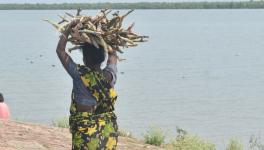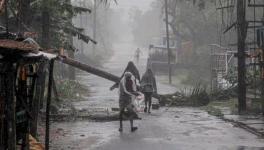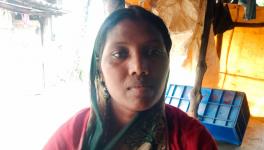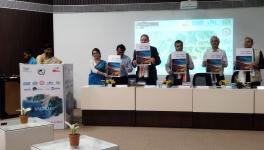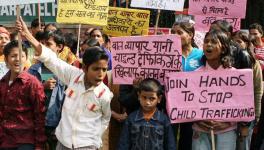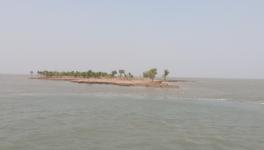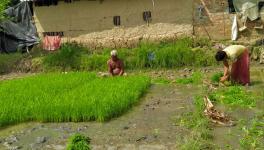Coal Plant Will Kill Sundarbans - Anu Muhammad
Souradeep Roy of Newsclick spoke to Anu Muhammad -- one of the leading public intellectuals of Bangladesh. Muhammad has been teaching Economics at Jahangirnagar University since 1983, and is also the member-secretary of the National Committee to Protect Oil, Gas, Mineral Resources, Power and Ports. The National Committee is a new kind of alliance which includes all the sections of the Left, academia, cultural activists and other progressive sections of the society, to organise campaigns against the corporate model of development which permanently endangers the environment, and destroys the livelihood of the people.
Muhammad explained the detrimental consequences of the newly-conceived Rampal power project on the environment of Sundarbans. The Sundarbans -- a UNESCO World Heritage Site and home to the second largest mangrove forest in the world -- is essential to the environment and livelihood of thousands living in both Bangladesh and India.
He was here in India to garner support for their campaign. At a time of rising religious fundamentalism in both Bangladesh and India, he stressed on the need for more solidarity from both the countries. He was hopeful that all progressive sections of South Asia would come together to conceive of an alternative development model which respects the environment, and is truly pro-people.
For further reading:
Read Anu Muhammad's article on both the Farakka and Rampal project here.
See images from the protests in Bangladesh against the Rampal project here. We thank the Centre for Financial Accountability for sharing these with us.
Read more articles by Anu Muhammed here.
Rough Transcript:
Souradeep Roy: Hello and welcome to Newsclick. We have with us Prof. Anu Muhammad who has been professor of Economics at Jahangirnagar University for over two decades.
Thank you very much for sparing your time and coming here to Newsclick. My first question to you is about the project that you are here in Delhi for, The National Committee to Protect Oil, Gas, Mineral Resources, Power and Ports. Could you tell us what exactly are the schemes that you are looking for and what exactly are you trying to achieve with this?
Muhammad: National Committee is a new form of alliance in Bangladesh. It was established in 1998. This is sort of left party plus alliance because there are some left parties within the National Committee, they have their differences on different issues but on certain issues, on natural resources, environment and national ownership, people’s ownership, people’s lives, we have come to a unity, a united alliance. Started work in 1998 on the issue of a deal on natural gas with a US company and their project, and after it was a big blow out in a gas field and the US company was trying to escape and then it started to mobilize people. So a new type of activities were grown up with this and we have had few success like: Stop export of gas; Stop many bad deals; government had to cancel including open pit mine in Northern Bangladesh. And recently we are in a movement that is getting huge public support that is on Sunderbans, to save Sunderbans, because that is the largest mangrove forest. This Sunderbans is like natural protection system for Bangladesh and about fifty million people in the coastal region from Bangladesh and India they are dependent on Sunderbans. So that is our latest campaign.
Roy: Sunderbans has been a site of contention now after the Rampal project was announced. So could you tell us the ramifications that you can foresee with that project in Sunderbans?
Muhammad: We came to know about this project in 2010. In 2010 we came to know that there is a government initiative to establish a coal-fired power plant very near to Sunderbans and it is 1320 mega-watts power plant. The main partner is NTPC of India, National Thermal Power Corporation and PDB of Bangladesh, there’s a joint effort: Bangladesh and India. A company was formed Bangladesh-India Friendship Company. They started evicting people from there even before environmental impact assessment. And it was very secret activities. But after we came to know from the local people were trying to save themselves. They formed Land Protection Committee and from them, they contacted us, then we visited the place, found that many irregularities are there. Then we started investigating: the work coal-fired power plant can affect, how that can affect and what the Sunderbans, the special eco-system, what are the dangers for Sunderbans and how it will affect the total eco-system, its bio-diversity and also ultimately the people. So it started investigating and in 2011 we came to the conclusion that we must resist this plan because Sunderbans is in many ways important for both the countries. This is a coastal..this is a world heritage site, this is the largest mangrove forest and this is in the coastal region divided between India and Bangladesh. There is 60% in Bangladesh and 40% in India, West Bengal. So in West Bengal about five million people dependent on Sunderbans for their livelihood, in Bangladesh part about four million people are directly dependent on Sunderbans and about fifty million people from both the countries ,fifty million people, dependent for their lives from the natural disaster, threat of natural disaster. They rely completely on Sunderbans, Sunderbans saves them. So in the coastal area and for the total eco-system of this coastal region, this is obviously very important to save from the world. It was already affected by Farakka. Because of Farakka Barrage the sweet water flow was disrupted. Because of that saline water, flow of saline water increased, that affected Sunderbans. So this Rampal power plant after coming this project: Rampal power plant that has become a final blow for Sunderbans. What we asked Government that first you stop this plant and then with India have a joint plan to save Sunderbans from other activities, other adverse activities, and the land-grabbing, forest-grabbing activities and also talk about water flow and since this is important for both the countries, both countries should come forward to save and expand the Sunderbans. Instead both the governments have become united to destroy the Sunderbans. That’s where our mobilization comes. From 2011 we started campaigning, there are many research work we have done and after that we contacted different experts from home and abroad: In Bangladesh, in India, different countries to understand and to explain all these things and to find huge types of mistakes and misleading information, and the lies, and the fraudulent different types of argument in the environmental impact assessment. So from 2013 we had several type of long march. It gained a huge public support. After 2013 we started connecting Indian activists and experts and we have some sort of co-ordination and I think it is very important not only for Sunderbans but for many other areas of solidarity and struggle.
Roy: I’d like to quote from one of the articles, I really found this line very moving. It says, you wrote, “ Nature is unbounded, barbed wire fences cannot stave off encroaching disaster”. This of course will mean disaster for both India and Bangladesh, so Sunderbans, as you said is artificially separated but its eco-system is spread out over the two countries. How do you think it’s important for left solidarity to come out of both the countries and in the larger context of left solidarity in South Asia to save our environment? Because there seems to be a kind of solidarity with rising religious fundamentalism both in India and Bangladesh, you yourself have been attacked in 2008, so how do you see that, once there is this kind of corporate-religious fundamentalism kind of an alliance going on? How do see this kind of alliance as central to oppose the alliance that will actually harm all of us?
Muhammad: Yes, this is very alarming situation we are living in today’s world. We must have the global context, we must keep in mind that the global context is also very important. After war on terror, so called war on terror, that gave ruling classes, the ruling classes of different countries ample opportunity to misguide people, to militarize more, to grab for corporate profit: land, the people’s lives, the people’s body ,and also forest and environment. For South Asia, every government, the Bangladesh Government, Indian Government, and Pakistan Government, all governments, most of the governments are like fighting, they are saying that “we are fighting terrorist” and from themselves they are producing, they are providing all the terrorist development, they are organizing developmental terrorism on the people and they are looking for justification by saying, “we are fighting terrorism”. So their co-operation is corporate co-operation and on the basis of corporate co-operation they are like exploring every possibility to privatize everything for corporate profit. So they don’t bother about the river, they don’t bother about forest, they don’t bother about the land, and people’s lives, people’s livelihood, everything. They are crazy about making profit. So they are like coming one after another different types of project. And so religious fundamentalism and religious fascism and this corporate fascism comes together. And everywhere, in India and Bangladesh, everywhere we are seeing that this corporate fascism, what we know from text books as new liberal reforms, this corporate fascism, is like, they need a soft window, like for example hindutva, or patriotism, or mukhti yudh chetna liberation: spirit of liberation war, all these things they are using as rhetoric and to bring a consent, manufactured consent among the people for themselves, to rationalize their looting, plundering and destruction of nature etc. But people’s lives and livelihoods, this environment, our history, our struggle are very much connected. We cannot in isolation, we cannot fight this: this barbarism. In South Asia the people’s lives and struggles are so much connected like environment, environment and nature, rivers, air nothing can be divided by the political border. If Bangladesh air is polluted, Indian air will be polluted, if Bangladesh water is gone, Bangladesh river is affected, ultimately India will also be affected. And for Sunderbans it is very much evident that this Sunderbans if affected in Bangladesh part it will affect Indian part. This friends and other things, political border, BSF and BJP, they will not be able to save this Sunderbans. So we the solidarity, our solidarity, if we can articulate our goals for a decent life, a people’s solidarity across religion, caste, class and the nationalities, then we’ll find that we’ll have solidarity on the issue of fighting communalism, fighting religious fascism, fighting real developmental terrorism and to find a vision for a really democratic, peaceful, environmentally sound development paradigm for South Asia. That is what we try to achieve and that is very much needed for the Left in Bangladesh, Left in India and Left Plus: there are other people in general to understand and come forward to have this solidarity into a solid, and very dynamic struggle. Since India is a big country and Indian Government is leading this South Asian corporate hegemony, people and the activists and the Left in India, they have more responsibility to materialize this solidarity. And if they take more initiative, I think it will be very easy to materialize our solidarity and people’s struggles all over South Asia.
Roy: Since you brought that up let me also ask you this question. Do you think that now, of course we know that, because of this war mongering speech that goes in around South Asia the actual development projects that will help the people in this region, irrespective of the countries and borders, they get cancelled for example as you know that the SAARC summit may not be held – which was supposed to be held because India pulled out, so how do you think that these particular decisions which are taken in the name of nationalism, in the name of working for the people actually help eradicate the actual parameters of development ?
Muhammad: The ruling class needs to keep the sense of conflict alive in the people’s mind. So they create tension , they create the possibility of war, and this war mongering patriotism that helps to help the armaments builders, armament business, that helps corporate business, that helps to obstruct the peoples to people connection . So we need to work for the alternative development paradigm. We have to bring the alternative development model before the people: that we need others very badly for existence of ourselves and for development of ourselves. And people to people connections in South Asia is crucial to find a new democratic South Asia.
Roy: We really hope that we will find that new democratic South Asia. Thank you very much for joining us here.
DISCLAIMER: Please note that transcripts for Newsclick are typed from a recording of the program. Newsclick cannot guarantee their complete accuracy.
Get the latest reports & analysis with people's perspective on Protests, movements & deep analytical videos, discussions of the current affairs in your Telegram app. Subscribe to NewsClick's Telegram channel & get Real-Time updates on stories, as they get published on our website.









